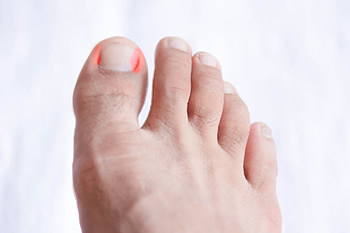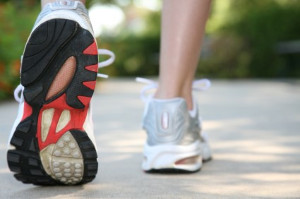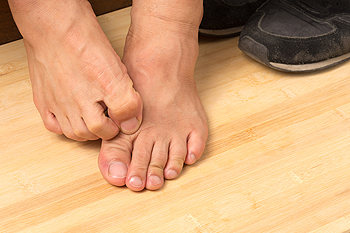Blog Archives
Items filtered by date: December 2020
Causes and Treatments for an Ingrown Toenail
 An ingrown toenail occurs when a curved toenail grows into the skin on the sides of the nail. The toenail digs into the skin and causes pain, redness, and swelling as the skin grows around the nail. If left untreated, it can cause a bacterial infection. Ingrown toenails are often caused by trauma, tightly fitting shoes, or cutting the toenails at an angle instead of straight across. Those who notice an ingrown toenail should treat it immediately by soaking it in warm water, drying it with a towel, and bandaging it. If there is significant swelling, pain, inflammation or discharge, the toenail is likely infected. Ingrown toenails that won’t heal, occur frequently, or are infected should be looked at by a podiatrist.
An ingrown toenail occurs when a curved toenail grows into the skin on the sides of the nail. The toenail digs into the skin and causes pain, redness, and swelling as the skin grows around the nail. If left untreated, it can cause a bacterial infection. Ingrown toenails are often caused by trauma, tightly fitting shoes, or cutting the toenails at an angle instead of straight across. Those who notice an ingrown toenail should treat it immediately by soaking it in warm water, drying it with a towel, and bandaging it. If there is significant swelling, pain, inflammation or discharge, the toenail is likely infected. Ingrown toenails that won’t heal, occur frequently, or are infected should be looked at by a podiatrist.
Ingrown toenails can become painful if they are not treated properly. For more information about ingrown toenails, contact Dr. Sharon Pletcher of Pennsylvania. Our doctor can provide the care you need to keep you pain-free and on your feet.
Ingrown Toenails
Ingrown toenails occur when a toenail grows sideways into the bed of the nail, causing pain, swelling, and possibly infection.
Causes
- Bacterial infections
- Improper nail cutting such as cutting it too short or not straight across
- Trauma to the toe, such as stubbing, which causes the nail to grow back irregularly
- Ill-fitting shoes that bunch the toes too close together
- Genetic predisposition
Prevention
Because ingrown toenails are not something found outside of shoe-wearing cultures, going barefoot as often as possible will decrease the likeliness of developing ingrown toenails. Wearing proper fitting shoes and using proper cutting techniques will also help decrease your risk of developing ingrown toenails.
Treatment
Ingrown toenails are a very treatable foot condition. In minor cases, soaking the affected area in salt or antibacterial soaps will not only help with the ingrown nail itself, but also help prevent any infections from occurring. In more severe cases, surgery is an option. In either case, speaking to your podiatrist about this condition will help you get a better understanding of specific treatment options that are right for you.
If you have any questions please feel free to contact our office located in State College, PA. We offer the newest diagnostic and treatment technologies for all your foot and ankle needs.
Read more about Ingrown ToenailsGout Pain Can Be Managed
Tips for Happy Feet
 Your feet support your weight and help you move throughout the day. Taking care of your feet can play a big role in maintaining your overall health. One of the most important aspects of good foot care is making sure that the shoes you wear are comfortable, supportive, and properly fitted. The right shoes can prevent a variety of painful injuries and foot conditions. Look for shoes that protect, cushion, and support your feet, and avoid shoes like flip flops, which are often flimsy and can increase your risk of foot pain. Proper hygiene is an important part of foot health as well. Wash and thoroughly dry your feet daily to avoid fungal infections, and trim your toenails straight across and not too short to help prevent ingrown nails. For more tips on everyday foot care, it is suggested that you consult with a podiatrist.
Your feet support your weight and help you move throughout the day. Taking care of your feet can play a big role in maintaining your overall health. One of the most important aspects of good foot care is making sure that the shoes you wear are comfortable, supportive, and properly fitted. The right shoes can prevent a variety of painful injuries and foot conditions. Look for shoes that protect, cushion, and support your feet, and avoid shoes like flip flops, which are often flimsy and can increase your risk of foot pain. Proper hygiene is an important part of foot health as well. Wash and thoroughly dry your feet daily to avoid fungal infections, and trim your toenails straight across and not too short to help prevent ingrown nails. For more tips on everyday foot care, it is suggested that you consult with a podiatrist.
Everyday foot care is very important to prevent infection and other foot ailments. If you need your feet checked, contact Dr. Sharon Pletcher from Pennsylvania. Our doctor can provide the care you need to keep you pain-free and on your feet.
Everyday Foot Care
Often, people take care of their bodies, face and hair more so than they do for their feet. But the feet are a very important aspect of our bodies, and one that we should pay more attention to. Without our feet, we would not be able to perform most daily tasks.
It is best to check your feet regularly to make sure there are no new bruises or cuts that you may not have noticed before. For dry feet, moisturizer can easily be a remedy and can be applied as often as necessary to the affected areas. Wearing shoes that fit well can also help you maintain good foot health, as well as making it easier to walk and do daily activities without the stress or pain of ill-fitting shoes, high heels, or even flip flops. Wearing clean socks with closed shoes is important to ensure that sweat and bacteria do not accumulate within the shoe. Clean socks help to prevent Athlete’s foot, fungi problems, bad odors, and can absorb sweat.
If you have any questions please feel free to contact our office located in State College, PA. We offer the newest diagnostic and treatment technologies for all your foot and ankle needs.
Read more about Every Day Foot CareWhat Can Cause Diabetes?
 There are many reasons people can develop diabetes. These can consist of genetics, environmental factors, and eating habits. The feet are often affected in diabetic patients, and it may be difficult to feel sensations. This can result in the development of foot ulcers, and in severe cases, the toes and entire foot can be lost to amputation. It is beneficial to check your feet on a daily basis for any cuts, scrapes, or sores. It is important to wear shoes that fit correctly, and this can be implemented by trying shoes on at the end of the day when the feet are generally at their largest. There are several methods diabetic patients can use to protect their feet, and it is suggested that a podiatrist be consulted for additional information.
There are many reasons people can develop diabetes. These can consist of genetics, environmental factors, and eating habits. The feet are often affected in diabetic patients, and it may be difficult to feel sensations. This can result in the development of foot ulcers, and in severe cases, the toes and entire foot can be lost to amputation. It is beneficial to check your feet on a daily basis for any cuts, scrapes, or sores. It is important to wear shoes that fit correctly, and this can be implemented by trying shoes on at the end of the day when the feet are generally at their largest. There are several methods diabetic patients can use to protect their feet, and it is suggested that a podiatrist be consulted for additional information.
Diabetic foot care is important in preventing foot ailments such as ulcers. If you are suffering from diabetes or have any other concerns about your feet, contact Dr. Sharon Pletcher from Pennsylvania. Our doctor can provide the care you need to keep you pain-free and on your feet.
Diabetic Foot Care
Diabetes affects millions of people every year. The condition can damage blood vessels in many parts of the body, especially the feet. Because of this, taking care of your feet is essential if you have diabetes, and having a podiatrist help monitor your foot health is highly recommended.
The Importance of Caring for Your Feet
- Routinely inspect your feet for bruises or sores.
- Wear socks that fit your feet comfortably.
- Wear comfortable shoes that provide adequate support.
Patients with diabetes should have their doctor monitor their blood levels, as blood sugar levels play such a huge role in diabetic care. Monitoring these levels on a regular basis is highly advised.
It is always best to inform your healthcare professional of any concerns you may have regarding your feet, especially for diabetic patients. Early treatment and routine foot examinations are keys to maintaining proper health, especially because severe complications can arise if proper treatment is not applied.
If you have any questions please feel free to contact our office located in State College, PA. We offer the newest diagnostic and treatment technologies for all your foot and ankle needs.
Read more about Diabetic Foot CareWhat Are Common Symptoms Of Athlete’s Foot?
A fungal infection of the skin on the feet is known as athlete's foot. It is often uncomfortable and may appear unsightly. Blisters can develop between the toes and the skin is generally red and itchy. Peeling skin may occur on the sole of the affected foot, and the toenails can become discolored. The fungus that causes this type of infection lives in warm and moist environments. These can consist of public swimming pools and shower room floors. It is beneficial to wear appropriate shoes while frequenting these areas as this may help to prevent the spreading of athlete's foot. Treatment methods can include applying topical antifungal medication, and this may help to provide mild relief. If you are afflicted with this ailment, please speak with a podiatrist who can determine what the best treatment is for you.
Athlete’s Foot
Athlete’s foot is often an uncomfortable condition to experience. Thankfully, podiatrists specialize in treating athlete’s foot and offer the best treatment options. If you have any questions about athlete’s foot, consult with Dr. Sharon Pletcher from Pennsylvania. Our doctor will assess your condition and provide you with quality treatment.
What Is Athlete’s Foot?
Tinea pedis, more commonly known as athlete’s foot, is a non-serious and common fungal infection of the foot. Athlete’s foot is contagious and can be contracted by touching someone who has it or infected surfaces. The most common places contaminated by it are public showers, locker rooms, and swimming pools. Once contracted, it grows on feet that are left inside moist, dark, and warm shoes and socks.
Prevention
The most effective ways to prevent athlete’s foot include:
- Thoroughly washing and drying feet
- Avoid going barefoot in locker rooms and public showers
- Using shower shoes in public showers
- Wearing socks that allow the feet to breathe
- Changing socks and shoes frequently if you sweat a lot
Symptoms
Athlete’s foot initially occurs as a rash between the toes. However, if left undiagnosed, it can spread to the sides and bottom of the feet, toenails, and if touched by hand, the hands themselves. Symptoms include:
- Redness
- Burning
- Itching
- Scaly and peeling skin
Diagnosis and Treatment
Diagnosis is quick and easy. Skin samples will be taken and either viewed under a microscope or sent to a lab for testing. Sometimes, a podiatrist can diagnose it based on simply looking at it. Once confirmed, treatment options include oral and topical antifungal medications.
If you have any questions, please feel free to contact our office located in State College, PA. We offer the newest diagnostic and treatment technologies for all your foot care needs.
Read more about How to Deal with Athlete's Foot






